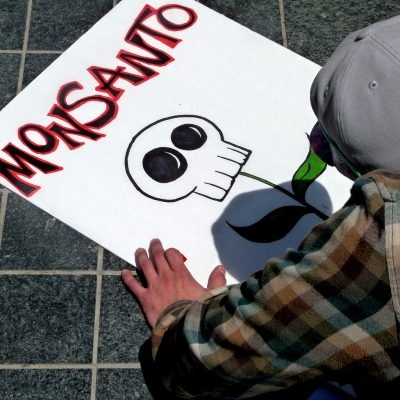Appeals Court Overturns a Monsanto Win on Roundup Cancer Issue

All Global Research articles can be read in 51 languages by activating the “Translate Website” drop down menu on the top banner of our home page (Desktop version).
To receive Global Research’s Daily Newsletter (selected articles), click here.
Follow us on Instagram and Twitter and subscribe to our Telegram Channel. Feel free to repost and share widely Global Research articles.
***
A federal appeals court has rejected a bid by Monsanto owner Bayer AG to head off claims brought by cancer victims alleging that Monsanto failed to warn them of the risks of Roundup.
In a decision handed down Tuesday, the 11th U.S. Circuit Court of Appeals ruled that a “failure to warn claim” brought against Monsanto in Georgia by Roundup user John Carson is not preempted by requirements under the Federal Insecticide, Fungicide, and Rodenticide Act (“FIFRA”) as lawyers for Monsanto, and its owner Bayer, have argued.
Bayer has sought – and now failed – in multiple courts to find backing for its argument that it should be protected from allegations that Monsanto failed to warn users of a cancer risk associated with its products. (Bayer bought Monsanto in 2018.)
The company asserts that if it had placed cancer risk warnings on product labels it would have conflicted with provisions of FIFRA that give the Environmental Protection Agency (EPA) 0versight of labeling language. The EPA has said in it assessment, the herbicides are “not likely” to be carcinogenic.
“It’s another resounding rejection of Monsanto’s preemption defense,” said attorney Brent Wisner, who served as co-counsel for the first trial to take place in the nationwide Roundup litigation, which resulted in a unanimous jury decision finding Monsanto had hidden the cancer risks of its weed killers.
“It is safe to say that their argument is dead. Every court to consider this issue has sided with plaintiffs,” Wisner said.
Bayer said in a statement that it believes the federal appeals court erred in its ruling.
“We respectfully disagree with the Eleventh Circuit’s decision, as a cancer warning would deviate from Roundup’s EPA-approved labeling, render the product misbranded, and require the company to make a label change that would be contrary to the consistent conclusions of EPA’s scientific assessments for more than four decades. The court’s determination that the FIFRA’s statutory registration process is not sufficiently formal to trigger preemption is inconsistent with Supreme Court precedent, and the company will review its legal options regarding further proceedings. ‘
The company also said in the statement that it “continues to stand fully behind its Roundup products, as the weight of scientific evidence and the conclusions of expert regulators worldwide continue to support the safety of glyphosate-based herbicides and that they are not carcinogenic.”
Carson is one of tens of thousands of people across the United States who have sued Monsanto alleging that their use of, or exposure to, Roundup or other Monsanto herbicides made with a chemical called glyphosate caused them to develop cancer.
The litigation began in 2015 after the International Agency for Research on Cancer classified glyphosate, the active ingredient in Roundup, as a probable human carcinogen with a noted association to non-Hodgkin lymphoma.
According to court filings, Carson used Roundup to treat weeds in his yard for roughly 30 years until he was diagnosed with malignant fibrous histiocytoma. He filed suit against Monsanto in 2017.
Bayer scored a win with the Carson case when the US District Court for the Southern District of Georgia ruled that his failure to warn claim was preempted by FIFRA and a related claim was also preempted for the same reason.
The appeals court ruling Tuesday reverses the district court findings, citing multiple reasons, including the fact that Congress created wide latitude for state regulation in the context of FIFRA. The court also said that the “EPA’s registration process is not sufficiently formal to carry with it the force of law…”
Bayer had gone so far as to ask the US Supreme Court to consider the preemption issue through two other cases the company lost at trial, but the high court rejected the company’s requests.
The twin rejections by the Supreme Court came after another blow to Bayer by the 9th U.S. Circuit Court of Appeals. On June 17 the 9th Circuit panel of judges said in their ruling that the EPA’s 2020 assessment of glyphosate was so deeply flawed that the court was vacating the agency’s human health assessment of the weed killer.
The 9th Circuit panel found that the EPA failed to follow established guidelines for determining cancer risk, ignored important studies, and discounted expert advice from a scientific advisory panel in officially declaring that the weed killer glyphosate was “not likely to be carcinogenic.”
Bayer has been attempting to settle the Roundup litigation, earmarking more than $11 billion for settlements, but while several firms have accepted settlements for their clients, many others have not and continue to press for trials. Several new trials are scheduled in the next few months.
*
Note to readers: Please click the share buttons above or below. Follow us on Instagram and Twitter and subscribe to our Telegram Channel. Feel free to repost and share widely Global Research articles.
Featured image is from Maui Independent

